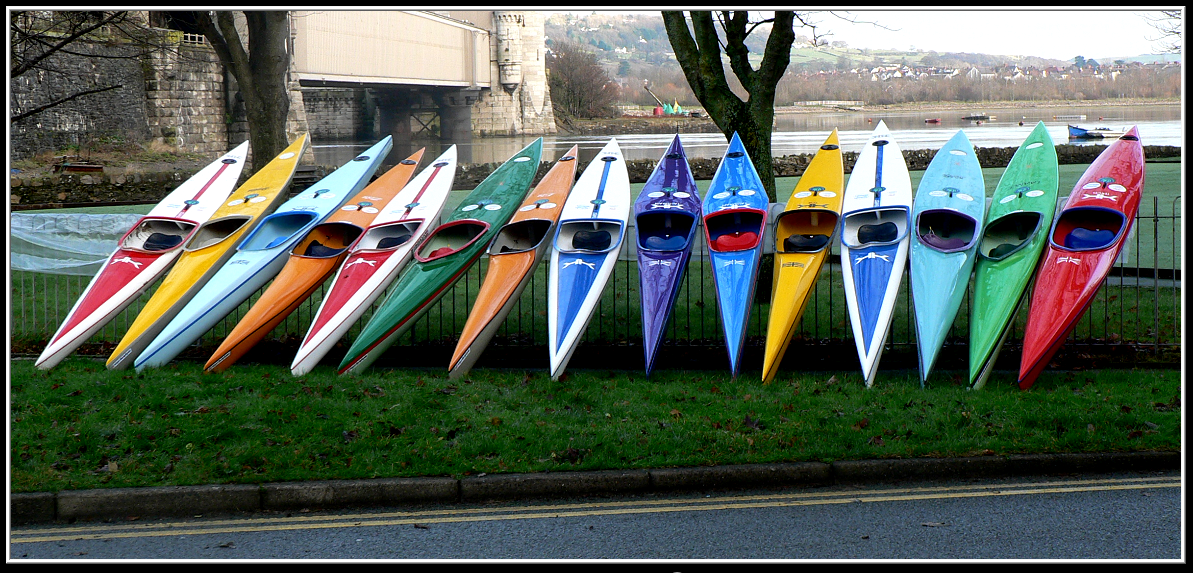Our Boats & Kit
A fire in 2012 destroyed practically all of our old boats but we were very fortunate to obtain a grant from the Environment Agency which allowed us to buy a varied fleet of new replacements.
The majority of our boats are marathon kayaks which have open cockpits and are steered by a foot operated rudder. They are designed to travel through water easily and are intended as race boats. Their streamlined design also makes them ideal touring boats as it is possible to travel a long way relatively easily. The large cockpit means that if the boat does capsize the paddler falls out easily. There is no need to learn the Eskimo Roll as it is practically impossible to roll these boats. In fact it is perfectly possible to fall out without getting your hair wet.
True racing boats, such as those used in the Olympic sprint races, are very narrow and therefore unstable. On a stability scale of 1 to 10 they are rated 1. The club boats range from a nicely reassuring stability 10, which just about anyone can paddle, to the more challenging stability 2 which requires much better balance. Many people never move beyond stability 8 and the majority of our boats are stability 8 to 10. The more streamlined boats can be faster to paddle, but only if the paddler is comfortable in the boat. In our estuary conditions many people prefer a more stable boat and find this allows them to work harder and therefore paddle faster. The less stable boats tend to be lighter to carry but Harry has had some boat trolleys made which make taking your boat to the water's edge much easier.
The grant also allowed us to buy four double kayaks which are lovely but too long to store in the container. They will be taken to lake sessions and can be made available for anyone who wants a go.
We also have a few other older boats which don't currently fit in the container but are brought out from time to time: two white water racers, two Trainers which are old style Tors, and two more proper racing boats, less stable than the Eta.
KIRTON TEMPEST: very stable, pretty light and very adaptable as both seat and footrest are easy to move. We loved the first two so much we bought two more.
KIRTON TERCEL: Very stable and well suited to the estuary as it has a high front deck. However there is not much adjustement on the seat so you have to be the right height for the boat.
'RAPIDE' Kayak - Very stable but also very heavy. The trolleys are definitely needed for these, but you don't need to worry so much if you run them over rocks or mussel beds.
TRIMMER: Another slight step in stability and the level at which many people stay. In our old fleet we had six of these which were very well used so it was an easy decision to get five this time. These are the boats without a name printed on them.
MARSPORT HOBBY2: A different manufacturer but a very similar design to the Trimmers. Some say they are the same to paddle, some reckon they steer slightly differently.
KIRTON TALISMAN: by a third manufacturer who goes for a flatish base and sides rather than the curved profile of the Trimmer and Hobby. A similarly comfortable stability level but slightly different reaction in waves due to its hull shape. One of these has had the footrest adjusted for taller people and one for shorter people so make sure you pick the right one.
KIRTON TOR: These are getting to be true racing boats and take a bit of practice. Like the Talismans they have flat sides. If you join a lake session and the sun is shining why not give it a go; you might surprise yourself.
MARSPORT EPSILON: the same stability grading as the Tor but with the rounded hull shape of the Hobby. Some prefer one design, some the other.
MARSPORT ETA: This is a proper race boat and looks like it. Probably one to try on the lake first but plenty of people do take them on the river.
 Click HERE
Click HERE
A bit more about STABILITY:
For an absolute beginner, ALMOST all kayaks and canoes feels wobbly at first! This might apply to your own craft. Several factors affect wobbliness, some are the caused by the type of kayak, some by the conditions of the water, some by experience, some by height and wight of the paddler. There's lots of good written and website information about kayak stability that cover the subject in more detail than we have space for here. Most people adapt quickly to balancing the more stable kayaks. Even some experienced kayakers find some of the sleeker racing boats impossible to stay upright in, whilst others appreciate those particular difficulties and develop skills to compensate for them.

